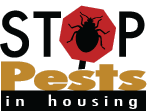Relevant Links for Public Health Professionals
The following resources were referenced during the "Biology and Control of Vector and Public Health Pests: The Importance of IPM" in Norwood, MA in May, 2012. This course was geared toward public health professionals.
Websites
- Pest Prevention by Design Guidelines
- VDACS fact sheets on bed bugs (including one for Home Health Care and Social Workers)
- Defining clutter, hoarding, etc
- REAC's definition of cockroach infestation
- CDC Vector Control
- National Park Service Rodent Exclusion Manual
- CT Ag Experiment Station's Tick Management Handbook
- MA DPH Tickborne Diseases in MA: a physician's reference manual
- MA DPH Tick Site
- Tick App for Smartphones
- Maine's Infectious Disease Epidemiology Program
- National Pesticide Information Center and their Repellent Search Tool
- Recognition and Management of Pesticide Poisonings (EPA)
- Maine's School IPM Program
- Massachusetts School IPM Program
- Want to tell others about IPM in Housing? Please download and share this promotional flyer.
Books
